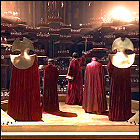 Nightmares plague the human race; every nightmare features the same laughing face – the face of a man that the world once knew as Harold Saxon. Most people forget the nightmares and are vaguely troubled the next day, but one man retains his memory of each incident – Wilfred Mott, Donna’s grandfather, who immediately begins to keep a watchful eye out for the Doctor’s return.
Nightmares plague the human race; every nightmare features the same laughing face – the face of a man that the world once knew as Harold Saxon. Most people forget the nightmares and are vaguely troubled the next day, but one man retains his memory of each incident – Wilfred Mott, Donna’s grandfather, who immediately begins to keep a watchful eye out for the Doctor’s return.
The Doctor, on the other hand, seems to be in no hurry to rush to the rescue. After events on Mars, he’s actively avoiding situations where he must save the day, but a visit to Oodsphere changes that. The Ood are also experiencing nightmares involving the Master, as well as a disjointed series of images of other people, including Wilfred and Donna. The Doctor returns to Earth and discovers that a cultish group of followers has resurrected the Master’s body, and the twisted Time Lord is now more powerful than ever, with abilities far beyond those of a normal Time Lord, and a bottomless appetite as a result. But not all-powerful: the Master is abducted before the Doctor’s eyes.
With Wilfred’s help, the Doctor tracks the Master down to the mansion of billionaire Joseph Naismith, who hopes to enlist the Master’s help to gain control over an alien artifact called the Immortality Gate. But the Master, even though he’s working at the point of a gun, has his own plans for the Gate – plans to achieve dominance over the human race and remake it in his own image.
written by Russell T. Davies
directed by Euros Lyn
music by Murray GoldCast: David Tennant (The Doctor), John Simm (The Master), Bernard Cribbins (Wilfred Mott), Timothy Dalton (The Narrator), Catherine Tate (Donna Noble), Jacqueline King (Sylvia Noble), Claire Bloom (The Woman), June Whitfield (Minnie Hooper), David Harewood (Joshua Naismith), Tracy Ifeachor (Abigail Naismith), Sinead Keenan (Addams), Lawry Lewin (Rossiter), Alexandra Moen (Lucy Saxon), Karl Collins (Shaun Temple), Teresa Banham (Governor), Barry Howard (Oliver Barnes), Allister Bain (Winston Katusi), Simon Thomas (Mr. Danes), Sylvia Seymour (Miss Trefusis), Pete Lee-Wilson (Tommo), Dwayne Scantlebury (Ginger), Lacey Bond (Serving Woman), Lachele Carl (Trinity Wells), Paul Kasey (Ood Sigma), Ruari Mears (Elder Ood), Max Benjamin (Teenager),
Silas Carson (voice of Ood Sigma), Brian Cox (voice of Elder Ood)
Notes: Naismith says that the Immortality Gate was originally recovered and held by Torchwood, and that he acquired it after Torchwood fell; this could either be referring to the fall of the London branch of Torchwood in Doomsday, or the destruction of Torchwood Cardiff in Children Of Earth. This episode marks the first time Bernard Cribbins has stepped into the TARDIS since the 1966 film Daleks: Invasion Earth 2150 A.D., in which he co-starred with Peter Cushing as the Doctor.
LogBook entry & review by Earl Green
Review: There’s no way the The End Of Time was not going to be a big deal; it’s the last hurrah for David Tennant as the tenth Doctor and for Russell T. Davies as the man who brought Doctor Who back to TV as a startling success story. There’s also the not-at-all-small matter of the story’s worst kept secret, the return of the Time Lords, indicating that this two-parter would have huge implications for the show’s mythology that would need to be dealt with by the new showrunner, writers and lead actor who would be picking up the reins in 2010.
Part one of The End Of Time reminds me, in a warm and fuzzy way, of the great season finale cliffhangers that the 1990s SF series Babylon 5 would routinely drop in our laps. Given the structure and conventions of the show, you know that big things will happen… but the scale of how big just doesn’t reveal itself until everything goes off the rails. Again, it was the worst-kept secret in the world that John Simm would be returning as the Master, but we didn’t know that he’d be showing up as billions of Masters (an impressive piece of composite FX work combined with literally dozens of shameless performances from John Simm). (I’d also be remiss if I failed to point out that the blurry visual effect indicating a hapless victim “becoming” the Master wasn’t virtually identical to the effect used when the Master tried to take over the body of the eighth Doctor in the 1996 TV movie. Whether this is an intentional homage or not, it’s one of those pieces of Doctor Who serendipity that goes a long way toward making the whole thing truly seem like an ongoing story.)
While we’re on the subject of John Simm, the Master is off-the-rails scary here, in some ways returning to the animalistic Master portrayed by Anthony Ainley in 1989’s Survival, and yet retaining the over-the-top insanity of Simm’s earlier appearances in the role (which itself maintains a steady throughline with the underrated Eric Roberts incarnation of the Master from the 1996 TV movie). On the other hand, David Tennant’s morose (at one point, even tearful) portrayal of a Doctor desperately trying to avoid his inevitable regeneration is sobering. The series has never quite gotten into the emotional impact of regeneration before, and a scene in a diner with Wilfred Mott hammers the point home. Even in past “final stories” such as Logopolis, in which Tom Baker played an unusually circumspect fourth Doctor at the end of his life, the story wound up with a fairly clinical wrap-up, i.e. “It’s the end, but the moment has been prepared for.” In the past, even with the cliffhanger shocker from The Stolen Earth / Journey’s End, the emotional component has always rested with the companions and the audience. It’s no exaggeration to say that we’ve never seen the Doctor like this before.
 We’ve also never seen the Time Lords like this before – completely at odds with their meek, weak, non-interventionist portrayal of the past, the Time Lord seen briefly at the end of this episode are literally frothing mad, as ex-James-Bond Timothy Dalton literally spews forth a rallying cry “for Gallifrey! For victory!” The Time Lords as they were in the classic series were more than enough trouble; the thought of them on a war footing is disquieting indeed. Even with all of the mentions of the Time War, it’s safe to say that most of us probably assumed that the “battles” were fought by sneaky interference with the timelines (a la Star Trek: Enterprise‘s temporal cold war, or perhaps in a more relevant vein, sending the fourth Doctor to prevent the Genesis Of The Daleks), or were fought by third parties altogether. We may have known that the Time Lords would be back, but not like this.
We’ve also never seen the Time Lords like this before – completely at odds with their meek, weak, non-interventionist portrayal of the past, the Time Lord seen briefly at the end of this episode are literally frothing mad, as ex-James-Bond Timothy Dalton literally spews forth a rallying cry “for Gallifrey! For victory!” The Time Lords as they were in the classic series were more than enough trouble; the thought of them on a war footing is disquieting indeed. Even with all of the mentions of the Time War, it’s safe to say that most of us probably assumed that the “battles” were fought by sneaky interference with the timelines (a la Star Trek: Enterprise‘s temporal cold war, or perhaps in a more relevant vein, sending the fourth Doctor to prevent the Genesis Of The Daleks), or were fought by third parties altogether. We may have known that the Time Lords would be back, but not like this.
Overall, a tantalizing (if somewhat deliberately vague) opening volley for Davies and Tennant’s curtain call.


